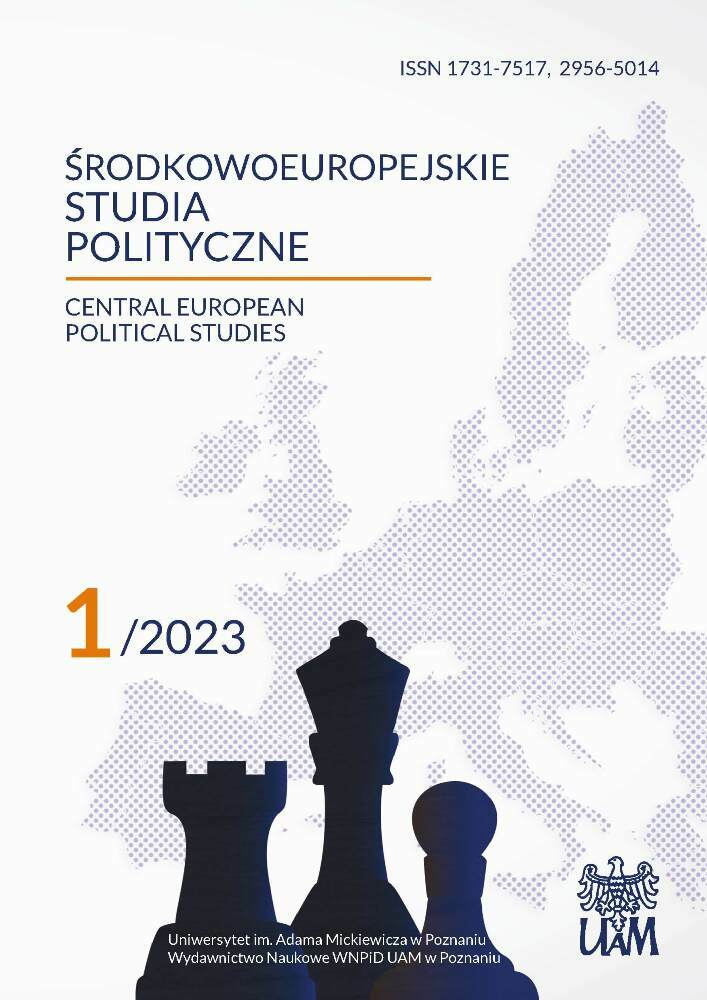Abstract
The material scope of the research problem in the text encompasses issues concerned with the essence and sense of the legal definition of a terrorist offence in the Polish criminal law. The Polish legislator implemented the definition of a terrorist offence under Art. 115 § 20 of the Criminal Code in 2014, which was caused by the necessity to align the Polish law with the EU regulations. Metaphorically, it needs to be recognized that the definition in a way modifies the prohibited act and the scope of criminal liability. The structure of the legal definition of a terrorist offence comprises two elements, which serve as conditions to be fulfilled by the perpetrator. The first condition is formal and is concerned with the severity of the sanction apportion to the perpetrator’s main act, while the second condition is motivational, and is concerned with a special goal actuating the perpetrator. Undoubtedly, the institution of the terrorist offence in the Polish criminal law serves a dissuasive and repressive purpose in relation to perpetrators of such offences.
In order to elaborate the objective scope of the analysis, the following research questions have been presented in the text: (1) To what degree is the legal definition of a terrorist offence effective in the criminal policy with regard to prevention and combating of the phenomenon of terrorism?, (2) To what degree may the content of the legal definition of a terrorist offence infringe the principle of nullum crimen sine lege certa?
The presented analysis is chiefly an overview, and has been performed while taking into account an institutional and legal approach. In this approach, textual, doctrinal and functional interpretations have been applied to the content of the legal definition of a terrorist offence. Given the discrepancies arising from the ambiguity of the terms used in the definition, relatively great emphasis has been laid on linguistic interpretation.
References
Act of 6 June 1997 - The Criminal Code (Journal of Laws 1997, no. 88, item 553, as amended).
Act of 16 April 2004 amending the Act - Criminal Code and certain other acts (Journal of Laws 2004, no. 93, item 889).
Announcement by the Speaker of the Sejm of the Republic of Poland of 31 January 2011 on correcting the mistake (Journal of Laws 2011, no. 24, item 130).
Barcik J., Srogosz T. (2019), Prawo międzynarodowe publiczne, Beck, Warszawa.
Bojarski M., ed. (2020), Prawo karne materialne. Część ogólna i szczególna, Wolters Kluwer, Warszawa.
Council Framework Decision of 13 June 2002 on combating terrorism (2002/475/JHA).
The Criminal Code (2010), PWN, Warszawa.
Directive (EU) 2017/541 of the European Parliament and of the Council of 15 March 2017 on combating terrorism and replacing Council Framework Decision 2002/475/JHA and amending Council Decision 2005/671/JHA.
Dunaj B., ed. (1996), Słownik współczesnego języka polskiego, Wilga, Warszawa.
Gardocki L. (2002), Prawo karne, Beck, Warszawa.
Gabriel-Węglowski M. (2018), Działania antyterrorystyczne. Komentarz, Kluwer, Warszawa.
Gasztold A., Gasztold P. (2022), The Polish Counterterrorism System and Hybrid Warfare Threats, “Terrorism and Political Violence”, no. 6.
Giezek J., ed. (2021), Kodeks karny. Część szczególna. Komentarz, Kluwer, Warszawa.
Gołda-Sobczak M., Sobczak W. (2018), Problem definicji terroryzmu, „Themis Polska Nova”, nr 2. DOI: https://doi.org/10.15804/tpn2018.2.04
Góralczyk W., Sawicki S. (2017), Prawo międzynardowoe publiczne w zarysie, Kluwer, Warszawa.
Górniok O. (2004), Przestępstwo o charakterze terrorystycznym w art. 115 § 20 k.k., "Przegląd Sądowy", no. 10.
Grześkowiak A., Wiak K., eds. (2019), Kodeks karny. Komentarz, Beck, Warszawa.
Judgement of the Appeals Court in Lublin of 16 March 2004, II AKa 407/03.
Judgement of the Appeals Court in Lublin of 18 July 2013, II AKa 117/13.
Judgement of the Provincial Administrative Court in Cracow of 27 March 2018, I SA/Kr 198/18.
Klafkowski A. (1979), Prawo międzynarodowe publiczne, PWN, Warszawa.
Konarska-Wrzosek V., ed. (2016), Kodeks karny. Komentarz, Kluwer, Warszawa.
Konarska-Wrzosek V., ed. (2020), Kodeks karny. Komentarz, Kluwer, Warszawa.
Królikowski M., Zawłocki R. (2015), Prawo karne, Beck, Warszawa.
Lachowski J., Marek A. (2016), Prawo karne. Zarys problematyki, Kluwer, Warszawa.
Mozgawa M., ed. (2017), Kodeks karny. Komentarz, Kluwer, Warszawa.
Mozgawa M., ed. (2020), Prawo karne materialne. Część ogólna, Kluwer, Warszawa.
Nawrocki M. (2016), Miejsce popełnienia czynu zabronionego, Beck, Warszawa.
Nowacki J., Tabor Z. (2016), Wstęp do prawoznawstwa, Kluwer, Warszawa.
Ostant W. (2016), Unia Europejska wobec zagrożenia terroryzmem – od Mastricht do Lizbony, IZ, Poznań.
Pohl Ł. (2019), Prawo karne. Wykład części ogólnej, Kluwer, Warszawa.
Romańczuk-Grącka M. (2020), Pojęcie i funkcje przymusu psychicznego w prawie karnym, Beck, Warszawa.
Warylewski J. (2017), Prawo karne. Część ogólna, Kluwer, Warszawa.
Wiatrowski P. (2013), Dyrektywy wykładni prawa karnego materialnego w judykaturze Sądu Najwyższego, Beck, Warszawa.
Witorska A. (2014), Czym jest tiret?, "Język Polski", vol. 94, no. 4. DOI: https://doi.org/10.31286/JP.94.4.2
Wojciechowski S., Osiewicz P. (2017), Zrozumieć współczesny terroryzm, Difin, Warszawa.
Wronkowska S. (2005), Podstawowe pojęcia prawa i prawoznawstwa, Ars boni et aequi, Poznań.
Wronkowska S., Ziembiński Z. (1997), Zarys teorii prawa, Ars boni et aequi, Poznań.
Zając D. (2017), Odpowiedzialność karna za czyny popełnione za granicą, IPK, Kluwer, Kraków.
Zakrzewski P. (2016), Stopniowanie winy w prawie karnym, Kluwer, Warszawa.
Zgorzały R. (2007), Przestępstwo o charakterze terrorystycznym w polskim prawie karnym, "Prokuratura i Prawo", no. 7-8.
Zieliński M. (1998), Wyznaczniki reguły wykładni prawa, "Ruch Prawniczy, Ekonomiczny i Socjologiczny", no.3–4.
License
Copyright (c) 2023 Remigiusz Rosicki

This work is licensed under a Creative Commons Attribution 4.0 International License.

